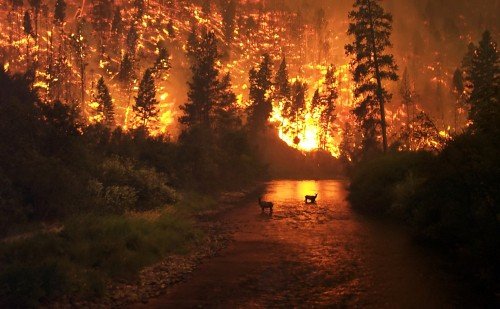
Over the past decade, the issue of pollution of the earth's atmosphere has become increasingly urgent. Climate change, caused by the buildup of greenhouse gases in the atmosphere, has become a major concern for people around the world. In this blog post, we will look at some of the key developments and events related to air pollution over the past ten years.
Paris Agreement
The Paris Agreement is a landmark agreement signed in 2015 by 196 countries to combat climate change. The agreement aims to keep the global temperature rise to below 2 degrees Celsius above pre-industrial levels, with a goal of limiting it to 1.5 degrees Celsius. The agreement also aims to strengthen the ability of countries to deal with the impacts of climate change.
Air Pollution in China
Air pollution has been a serious problem in China for many years. In 2013, a thick layer of smog covered Beijing, causing many people to stay indoors and wear masks to protect themselves from the polluted air. The Chinese government has since taken steps to address the problem, including shutting down factories and power plants, and implementing stricter emissions standards.
California Wildfires
In recent years, California has experienced some of the worst wildfires in its history. In 2018, the Camp Fire burned over 150,000 acres and killed 85 people. The fires have been linked to climate change, as warmer temperatures and drier conditions have made the state more susceptible to wildfires.
Volkswagen Emissions Scandal
In 2015, it was revealed that Volkswagen had installed software in their diesel cars that could cheat emissions tests. The scandal led to fines and lawsuits against the company, and raised questions about the accuracy of emissions testing more broadly.
Paris Climate Accord Withdrawal
In 2017, the United States announced its intention to withdraw from the Paris Agreement. The decision was widely criticized by environmentalists and other countries, who argued that the United States should be doing more to combat climate change.
The Paris Agreement is a landmark international treaty signed by 196 countries in 2015, with the aim of combating climate change and reducing greenhouse gas emissions. The agreement represents a global effort to limit global warming to below 2 degrees Celsius above pre-industrial levels, with a goal of limiting it to 1.5 degrees Celsius. In this blog post, we will take a closer look at the Paris Agreement and its significance in the global fight against climate change.
Background
The Paris Agreement builds on previous international agreements to address climate change, including the United Nations Framework Convention on Climate Change (UNFCCC) and the Kyoto Protocol. The UNFCCC, signed in 1992, established a framework for international cooperation on climate change, while the Kyoto Protocol, signed in 1997, set binding emissions targets for developed countries.
However, the Kyoto Protocol was criticized for not including emissions targets for developing countries, which were expected to account for the majority of emissions growth in the coming years. The Paris Agreement sought to address this issue by including commitments from all countries, including both developed and developing nations.
Key Provisions
The Paris Agreement includes several key provisions, including:
-
Nationally Determined Contributions (NDCs): Each country is required to submit a plan outlining their emissions reduction targets and the actions they will take to achieve them. These plans are known as Nationally Determined Contributions (NDCs).
-
Long-Term Goal: The agreement sets a long-term goal of limiting global warming to well below 2 degrees Celsius above pre-industrial levels, with a goal of limiting it to 1.5 degrees Celsius.
-
Adaptation: The agreement recognizes the need for adaptation to the impacts of climate change, particularly in vulnerable countries and communities.
-
Financial Support: Developed countries are required to provide financial support to developing countries to help them transition to a low-carbon economy and adapt to the impacts of climate change.
Significance
The Paris Agreement is significant for several reasons:
-
Universal Participation: The agreement is the first to include commitments from all countries, both developed and developing. This represents a significant step forward in the global effort to combat climate change.
-
Long-Term Goal: The agreement sets a clear long-term goal of limiting global warming to well below 2 degrees Celsius above pre-industrial levels. This provides a clear framework for countries to work towards, and helps to focus global efforts on reducing emissions.
-
Adaptation: The agreement recognizes the need for adaptation to the impacts of climate change, particularly in vulnerable countries and communities. This is an important recognition of the fact that climate change impacts will not be evenly distributed, and that some countries and communities will be more severely affected than others.
-
Financial Support: The agreement requires developed countries to provide financial support to developing countries to help them transition to a low-carbon economy and adapt to the impacts of climate change. This is an important recognition of the fact that developed countries have historically been the largest emitters of greenhouse gases, and have a responsibility to help developing countries address the impacts of climate change.
Extinction Rebellion Protests
Extinction Rebellion is a global movement that advocates for immediate action to address climate change. The movement has staged protests and civil disobedience actions in cities around the world, calling for governments and corporations to take action to reduce greenhouse gas emissions.
Australian Bushfires
In late 2019 and early 2020, Australia experienced some of the worst bushfires in its history. The fires burned millions of acres of land and killed dozens of people and wildlife. The fires were linked to climate change, as hotter and drier conditions made the country more susceptible to wildfires.
COVID-19 Pandemic
The COVID-19 pandemic, which began in 2020, had a significant impact on air pollution. As countries around the world went into lockdowns, transportation and industrial activity decreased, leading to a drop in air pollution levels in many cities.
India's Air Pollution Crisis
Air pollution is a major problem in India, particularly in the country's cities. In recent years, the problem has become increasingly urgent, with some cities experiencing air quality levels that are hazardous to human health. The government has taken steps to address the problem, including implementing emissions standards for vehicles and shutting down coal-fired power plants.
Climate Change and Extreme Weather
Climate change has been linked to an increase in extreme weather events, such as hurricanes, floods, and droughts. These events can have a significant impact on air quality, as they can release pollutants into the atmosphere and disrupt transportation and industrial activity.
In conclusion, the issue of pollution of the earth's atmosphere has become increasingly urgent over the past decade, as climate change and other factors have led to worsening air quality in many parts of the world. Governments, corporations, and individuals all have a role to play in addressing this problem.








